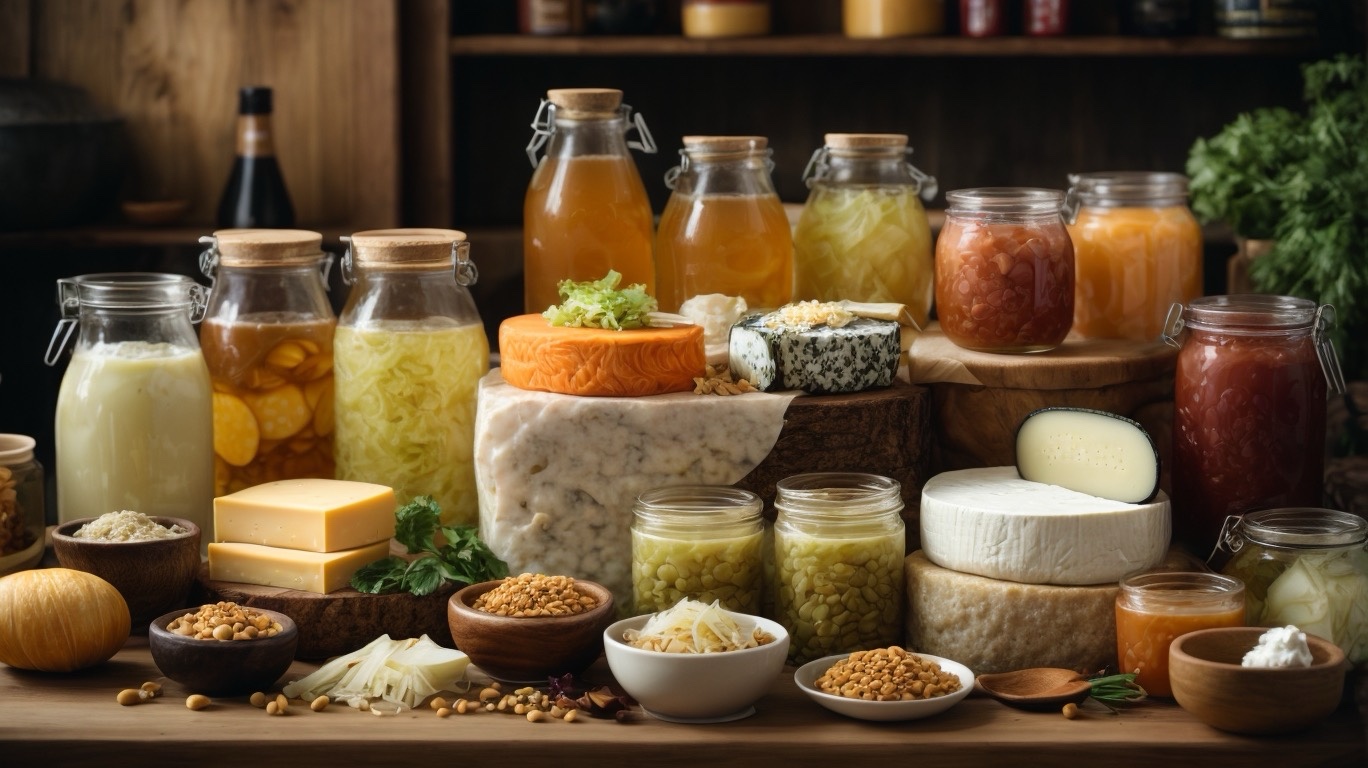 Mind
Mind
- Digital and Modern Well-being
- Mental Health and Emotional Well-being
- Mind-Body Connection and Holistic Health
- Parenting and Family
- Personal Growth and Development
- Relationships and Social Well-being
- Stress and Relaxation
- Therapeutic and Creative Practices
- Trauma and Recovery
- Work, Productivity, and Discipline
 Body
Body
 Fitness
Fitness
 Food
Food
 Beauty
Beauty
Benefits of Fermented Foods

The Unexpected Power of Pickles and Probiotics
Fermentation isn’t just an ancient preservation technique; it’s a powerhouse of nutrition, gut health, and flavour. From the creamy tang of Greek yoghurt to the fizz of kombucha, these foods do more than just taste good—they actively enhance your health in ways modern science is only beginning to fully understand.
A 2,000-Year-Old Health Trend That Still Holds Up
Fermented foods have been around for centuries. Before refrigeration, people needed ways to keep food from spoiling, and fermentation was the answer. But as it turns out, this accidental discovery wasn’t just about preservation—it also created some of the most nutrient-dense foods on the planet.
The process works by allowing beneficial bacteria and yeasts to break down sugars and starches in food, creating probiotics—live microorganisms that support gut health. While trendy in the modern wellness world, cultures worldwide have been enjoying these foods for millennia:
- Korea gave us kimchi, a spicy, tangy cabbage dish packed with probiotics.
- Japan is home to miso and natto, both rich in beneficial bacteria and enzymes.
- Germany perfected sauerkraut, a sharp and crunchy companion to hearty meals.
- India brings us lassi, a traditional probiotic yoghurt drink.
- Mexico delights with tepache, a fermented pineapple drink with a refreshing fizz.
How Fermented Foods Benefit Your Body
1. They Supercharge Your Gut Health
Your gut is home to trillions of bacteria—some friendly, some not so much. Fermented foods introduce probiotics, the “good guys” that help balance your microbiome. A healthy gut means better digestion, stronger immunity, and even improved mental health.
💡 Tip: If you’re new to fermented foods, start with a few spoonfuls of sauerkraut or a small glass of kombucha daily to let your gut adjust.
2. They Can Strengthen Your Immune System
Over 70% of your immune system resides in your gut. When your gut is happy, your immune defences are stronger. Regularly consuming fermented foods can help your body fight infections, reduce inflammation, and even lessen allergy symptoms.
🔍 Case Study: A study published in the journal Frontiers in Immunology found that probiotics from fermented foods can enhance the body’s ability to ward off colds and flu.
3. They Help Improve Digestion
Ever felt bloated after a meal? Fermented foods contain enzymes and beneficial bacteria that break down food more efficiently, reducing bloating, gas, and indigestion. This is especially helpful for people with lactose intolerance—fermented dairy like kefir and yoghurt contain bacteria that help digest lactose.
💰 Pricing: In the UK, a 500ml bottle of kefir costs around £1.50–£3, while in the US, prices range from $3–$5 depending on the brand.
4. They Support Mental Health
The gut-brain connection is real. Scientists now believe that the state of your gut can affect everything from anxiety to depression. Fermented foods help nourish this connection by promoting a healthy balance of gut bacteria, which in turn influences brain function.
5. They May Help With Weight Management
Some studies suggest that a healthy gut microbiome can aid in weight loss and weight management. Certain probiotics in fermented foods help regulate metabolism and reduce cravings, making it easier to maintain a balanced diet.
💡 Tip: Swap out sugary sodas for kombucha—a low-calorie, probiotic-rich alternative that satisfies cravings while supporting gut health.
How to Incorporate More Fermented Foods Into Your Diet
Adding fermented foods to your daily routine doesn’t have to be complicated. Here are some easy (and delicious) ways to get started:
- Breakfast: Add a spoonful of Greek yoghurt to your smoothie or top your toast with cottage cheese.
- Lunch: Toss some sauerkraut or kimchi into your salad or sandwich for extra crunch and flavour.
- Dinner: Use miso in soups or marinades for a rich umami taste.
- Snacks: Munch on pickles or sip a glass of kefir for a probiotic boost.
🛒 Where to Buy: You can find fermented foods in most supermarkets, health stores, and online retailers like Amazon, Holland & Barrett (UK), or Whole Foods (US).
Can You Make Fermented Foods at Home? Absolutely!
Homemade fermented foods are often cheaper and more potent in probiotics than store-bought options.
Easy Fermented Cabbage (Sauerkraut) Recipe
🛍️ Ingredients:
- 1 medium cabbage
- 1 tbsp salt
- 1 tsp caraway seeds (optional)
👨🍳 Instructions:
- Chop the cabbage and mix it with salt in a large bowl.
- Massage the cabbage for 5–10 minutes until it releases liquid.
- Pack it tightly into a jar, ensuring the liquid covers the cabbage.
- Cover with a clean cloth and let it sit at room temperature for 5–7 days, tasting along the way.
💰 Cost Comparison: A store-bought jar of sauerkraut costs around £2–£4 in the UK and $3–$6 in the US, while homemade sauerkraut costs just pennies per serving!
The Takeaway
Fermented foods are more than just a trendy health craze—they’re a time-tested way to boost digestion, strengthen immunity, and improve overall well-being. Whether you’re sipping on kombucha, spooning kimchi onto your plate, or making your own sauerkraut, these probiotic-rich foods can be a simple and delicious addition to your lifestyle.
So why not start today? Pick up a jar of pickles, try a glass of kefir, or even experiment with fermenting your own veggies at home. Your gut (and your taste buds) will thank you!

